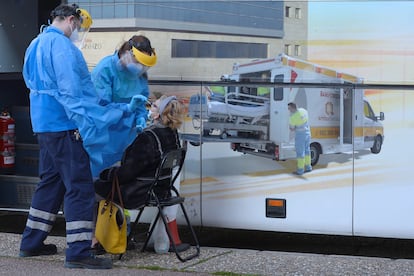Four Spanish regions set new highs for daily coronavirus cases
Madrid to let care centers hire staff without the usual qualifications to make up for shortages

Spain’s sixth wave of the coronavirus continued to set new case records on Three Kings’ Day, a national holiday that brings families together for present-opening and shared meals. Instead, thousands of people spent Thursday in self-isolation after testing positive for the virus. Over 700,000 cases have been diagnosed in the past week and the numbers remain on an upward trend.
Out of the 10 regions that reported figures on Thursday – the central Health Ministry does not release data on public holidays – four of them set all-time highs: Aragón reported 7,476 new daily cases, followed by Murcia with 5,520 infections, the Balearic Islands with 4,044 and Cantabria with 2,218. Navarre, which has been topping caseload figures for weeks, on Thursday reported 1,647 new cases, around half of the 3,384 confirmed on Wednesday.
The surge in cases is also keeping many essential workers at home, leading to reduced staffing numbers in healthcare centers, law enforcement agencies and public transit systems. In the Madrid region, authorities said that daycare centers, senior homes and home assistance services will be allowed to temporarily hire workers without the qualifications that are normally required, as these services scramble to make up for all the sick leaves and quarantines among their regular employees.
Sources from the Madrid department of Family, Youth and Social Policies told the news agency Europa Press that the highly transmissible omicron strain of the coronavirus has not had a serious health impact on either center personnel or residents, but that “it forces us to make do without workers affected by Covid-19 in order to try to curb contagion, as these are centers with elderly people who could be more vulnerable.” During the first wave of the pandemic in early 2020, care homes were at the center of a national scandal when it emerged that many infected residents were being denied transfers to overwhelmed hospitals and in some cases left to die at understaffed centers.
Four weeks for booster shots
People who get infected with the coronavirus will have to wait at least four weeks after their diagnosis before receiving a booster shot even if they are eligible for one now, according to an update published on Wednesday by the Health Ministry. For now, third doses are being recommended for the over-40 population, who must wait six months if their last dose was made by Pfizer-BioNTech or Moderna and three months if it was by AstraZeneca or Janssen.
The update also establishes that unvaccinated individuals who get infected (only 10% of the over-12 population is not vaccinated) may receive a single dose four weeks after the infection, or two doses in the case of people over 65 years of age.
“Individuals requiring a vaccination certificate showing at least two doses, for international travel or study purposes for instance, may receive a second dose, which will be regarded as a booster shot,” reads the document. This is due to the fact that some countries require visitors to show proof of at least two doses, regardless of whether they have recovered from Covid-19 in the past.
The update also states that children between the ages of five and 12 will receive their second shot eight weeks after the first. If they have been infected, they will receive a single shot at least four weeks after the diagnosis or onset of symptoms.
Tu suscripción se está usando en otro dispositivo
¿Quieres añadir otro usuario a tu suscripción?
Si continúas leyendo en este dispositivo, no se podrá leer en el otro.
FlechaTu suscripción se está usando en otro dispositivo y solo puedes acceder a EL PAÍS desde un dispositivo a la vez.
Si quieres compartir tu cuenta, cambia tu suscripción a la modalidad Premium, así podrás añadir otro usuario. Cada uno accederá con su propia cuenta de email, lo que os permitirá personalizar vuestra experiencia en EL PAÍS.
¿Tienes una suscripción de empresa? Accede aquí para contratar más cuentas.
En el caso de no saber quién está usando tu cuenta, te recomendamos cambiar tu contraseña aquí.
Si decides continuar compartiendo tu cuenta, este mensaje se mostrará en tu dispositivo y en el de la otra persona que está usando tu cuenta de forma indefinida, afectando a tu experiencia de lectura. Puedes consultar aquí los términos y condiciones de la suscripción digital.








































